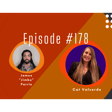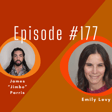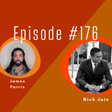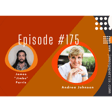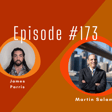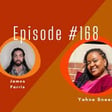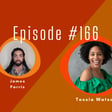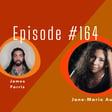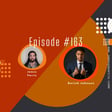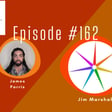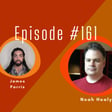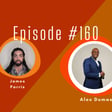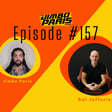00:00:02
Speaker
All right. Testing one, two, three. Hello, everyone. How's it going?
Introduction of Jim Van Allen and His Core Values
00:00:07
Speaker
This is James here.
00:00:09
Speaker
We have another special guest, Jim Van Allen. How are you doing today? I'm doing great. It's good to be here. Awesome to be here. All right. So to get this started again, this show is going to be 100% about you and I'm going to just be, you know, we're just going to have a little talk here and a bit of a chat on, you know, who you are, what you're about, what your message is. And, you know, the first question I have for you is who is Jim Van Allen?
00:00:39
Speaker
And what do you sort of represent?
Jim's Service Philosophy in Education
00:00:41
Speaker
Jim Van Allen is first and foremost, he's a husband, he's a father, he's a believer, and he's a speaker. That's me. And my life word is serve. That's me. I always want to be involved in service of my family.
00:01:04
Speaker
of my faith, my audiences. I want to be a person who is remembered for having great relationships and a servant's heart. And a lot of my messages when I speak to audiences, schools, places across the country, because I do a lot of public speaking on culture, positive school culture and all that.
00:01:29
Speaker
It stems from that. I tell people, I say, listen, if you're in education, you're in the service industry. You're here to serve. You're here to love on other people. And that's not far off from what I believe from my own self. So I'm all about service to others and building great relationships.
Journey of Introversion to Public Speaking
00:01:53
Speaker
When did this desire to serve others begin within you? Yeah, that's a great question. I think from when I was younger, just as a kid growing up, I always loved being involved in classroom and school and helping the teacher out and just always had great relationships with kids around me and was sort of a joyful kid.
00:02:20
Speaker
And I think as I got a little older, high school, college, I started to realize that I was a bit more of an introvert, believe it or not, even though I do a ton of public speaking, you know, and I'm on stage and in front of people a lot. It's not an easy thing to do all the time.
00:02:36
Speaker
And when you're a little bit more of an introvert, you start just noticing people more. You start noticing body language and tendencies, and you realize that sometimes the best people for the spotlight are the ones who really don't want it. And believe it or not, that's me sometimes. If I'm on stage, if I'm helping some teachers, coaching calls, things like that,
00:02:59
Speaker
I'm not doing it because it makes me feel good. I'm doing it because I hope the audience feels better afterward. I'm hoping that they walk away with some strategies and takeaways and the schools that I work with become better places. It's not about getting me a pat on the back, right? So, as personalities shift a little bit, as I get a little older,
00:03:17
Speaker
When you become a little more introverted to an extent, it starts being about other people and not about you. And I've taken that now into my work for sure.
Mission for Positive School Environments with John Gordon
00:03:29
Speaker
Let's talk a bit about your work. What do you focus on really in your mission? The mission to me is simple. It's to create positive schools and positive people inside of those schools.
00:03:45
Speaker
If you talk to anybody who's in education now, principals, teachers, whomever, they will tell you that it's challenging, state by state, wherever you go. It's challenging because I do believe teachers are woefully underpaid. I do believe that there's a lot more scrutiny on teachers and educators in schools now than ever before. I do believe that a lot of those places are being micromanaged. I also believe that
00:04:13
Speaker
But society and how they're raising children and parents and things like that are sending kids to school that they're using it as a daycare, right? And parents are not as involved in their children's education. So when you say that, it shows you that there's a real opportunity out there to change the perception around schools and change the lives and the people inside of schools.
00:04:37
Speaker
So I've looked at it as my work and my work with John Gordon, who I've partnered with, and he's got 28 best-selling books out. We form a great team that we want to help these individuals be the best version of themselves while they're at school and when they're home, too, with their family.
00:04:55
Speaker
And that's really essential to be the best version of yourself. So we give people strategies, solutions to help change their mindset into a more positive mindset, to develop stronger, more unified teams and give them ideas to try in their classrooms with their students to build their positive thinking and positive mindsets up. So that's a lot of the work that we do is boils down to creating positive school culture everywhere.
Balancing Academics with Life Skills
00:05:25
Speaker
positive school culture. So what is your opinion on school system as a whole? Are you an advocate of how Common Core works? The fact that maybe we might not learn general financial skills in Common Core education usually. How specific is it getting? Or is it more about mental health? What angle are you sort of going for here when it comes to your unique
00:05:53
Speaker
offering or what you think is a school action. Hopefully that made sense. I would say my program, The Energy Bus for Schools, we're focused on educating the whole child, right? If you become a certified energy bus school, you're in our program that helps build culture. We are helping with positive mental health of staff and students and we're helping to
00:06:17
Speaker
you know, give these students ways of looking for the good in the world and not succumb to negativity. So in saying that, that's social emotional type learning, right? Resiliency skills. So with me saying that, I am a believer that, you know, I'm a product of public schools and I enjoyed myself in school. Like it was a great foundation for me. It was fine, it was awesome. I came from great schools where I lived in Tampa, Florida.
00:06:50
Speaker
As I've gotten older though, and you have to pay your taxes, which I need to work on soon, when you have to develop financial literacy, when you have to learn about voting and political parties, and when you have to learn about basic table manners and public speaking and just life skills, right? How to fix a leaky faucet, things like that. I do believe there's more opportunity out there for schools to diversify their learning.
00:07:10
Speaker
I would say though that...
00:07:19
Speaker
Okay, and I applaud a lot of schools out there who take a different path and who teach those skills and offer those classes, sometimes even as a requirement, because school to me is more than just math, science, reading, English, right? We need those fundamental subjects.
00:07:42
Speaker
I would almost reimagine schools, right? I would almost reimagine them in a place where you have life skills combined with the academic skills that you need.
00:07:51
Speaker
working with students on helping them to understand what exactly this is teaching them. If they have to read to Kill a Mockingbird that every student does, right, for the last 40, 50 years, or they have to do this math equation or take a public speaking class, what are they gaining from it that will help them in life, right? Like it may not be, you learn the slope of a line. Okay, great. You learn that skill. That helps your brain, of course. But how does learning that skill help me later on? So I think there needs to be a more, a little bit more
00:08:20
Speaker
of that worked in because when you work relevancy into your curriculum, it's going to make students appreciate it more and want to file it away more. So that's what the academic piece. Then you have the non-academic piece, which is the life skill stuff.
00:08:37
Speaker
where I think there needs to be more of that, right? More electives and more schools that are willing to break the mold and say, we're going to do things a little bit differently and more school boards, public schools that are willing to support those initiatives and those schools out there, even as model test schools where they want to simply do things a little bit different. And I applaud the Mavericks out there. So you mentioned that you're a Floridian. What is it like, you know, living in Florida?
00:09:07
Speaker
You know, do you think that maybe has influenced your perspective or outlook?
Life in Florida and Personal Philosophy
00:09:12
Speaker
I know there's a lot of big things there. Disney, a lot of interesting political stuff going on in there. Not sure, but...
00:09:20
Speaker
you know what's the significance about florida do you think that's relevant to your life in any way and becoming the man that you are today i mean i'm definitely a proud floridian i've lived here since i was born you know i i've never lived outside of this state i've traveled to 43 other states so i have been all over the country and i've seen
00:09:40
Speaker
different ways of life and education systems and I have a healthy respect for other states and other cultures and I love dropping into these states and cities. Seeing things there in my speaking travels and then coming back home.
00:09:57
Speaker
Florida to me is a place where there's so much uniqueness down here. Like you can travel an hour north, an hour west, an hour south of me and there's different accents and ways of life and ways of doing things. And I know there's a certain perception out there about the Florida man or Florida things out there.
00:10:16
Speaker
But quite frankly, my family and I have never been happier down here in the schools that we're in. My kids are thriving. We're in a school district that's the number seven best school district in the entire state of Florida, the number 19 elementary school in the entire state out of thousands.
00:10:36
Speaker
I couldn't be happier living here and being around the people that are here. And I do believe it's shaped me. I think it's given me just an open-mindedness. It's given me a sense of peace living down here. We have beautiful weather. We got great people. We have people that love living here and love our country too and want to provide a good blueprint for the rest. So speaking of this whole idea of blueprints,
00:11:05
Speaker
What do you think is your blueprint for your life? As far as impacting others or what they can learn from me or? I actually am thinking more about the angle from you. What is your blueprint?
00:11:19
Speaker
Well, so when you think about what a blueprint is, right, it's it's a set of plans that that show how something is going to be constructed or made, right? It shows the inner workings of something, you know, of a house, you're going to see all the the measurements and angles and lines and just think about it at a nuts and bolts level. So my blueprint, if you were to spread me out on a on a piece of paper, something like that is going to be somebody who
00:11:49
Speaker
definitely doesn't go with the crowd. It's definitely somebody who thinks for themselves. It's definitely somebody who loves to have a healthy joy for life, loves laughing at dry humor, and really does try to
00:12:07
Speaker
look for the positive things that are out there and tries not to complain and tries to be solution oriented. That's going to be me in a nutshell. And I do believe that has helped me as a speaker as I try to impact people all over because who they see on stage, they see me, they see my blueprint. And I try to share that with others in a way that's going to help them.
Coaching Style and Leadership Growth
00:12:32
Speaker
Do you see yourself as
00:12:36
Speaker
a coach? In some instances, yes, because I host, I do host coaching calls for a lot of school leaders and principals who are in my program. I have been a coach for my son's soccer teams, and we're starting a soccer team now, right? So I do believe that that is in me. But I'm not the kind of coach where
00:12:59
Speaker
I'm like the in-your-face kind, right? I'm more of a one-on-one relationship builder, speak softly, but carry a big stick kind of coach, right? I'm an encourager when I'm coaching or I'm in that role. I'm a teacher. I'm an encourager and a teacher.
00:13:16
Speaker
And I want to make sure people are in the best position possible, whether it's on the soccer field, making sure they know where they're supposed to be or in life with with schools, making sure principals and teachers have the tools they need to be the best versions of themselves. So I think as an encourager and as a teacher, that's a good recipe for a pretty good coach. What type of
00:13:43
Speaker
What type of, here's a better question. What is your definition of a coach?
00:13:48
Speaker
Well, I mean, I don't often like to get it's diversified. It's I mean, you think of all the great coaches that are out there and they have all different types of skill sets and styles. But if you boil it down with all those individuals and different coaching styles, right? I believe I my definition would be somebody who wants to have a positive impact and move a team or move an individual forward.
00:14:15
Speaker
You don't need a coach if you're just stuck in the status quo or going backwards. So to me, a coach has a positive impact and is always trying to teach and move the team or individual forward. And that might be through challenging situations, it might be through losing, it might be through struggles personally, but you are there to
00:14:39
Speaker
to teach them, to offer guidance, to build a great relationship, to be positive, and to hold them accountable to the things you're trying to teach them to do. How do you hold your clients accountable? Well, as far as the accountability piece comes with
00:14:59
Speaker
the frequency in which we meet. So I can talk to, and I do mostly our group coaching unless somebody wants to talk to me specifically, but I can give them something to work on one month and then
00:15:12
Speaker
When we get together as a group, I ask them to share what it is they're doing or have learned or have tried. And in that sense, that holds them accountable because they expect expectations that they'll share some of the things that they've been working on.
00:15:29
Speaker
So I think that accountability piece comes in that way and to the sense where they know that I'm approachable and they can come to me at any point and ask for guidance or feedback. I think the more visible you are as a coach and as a leader, as a teacher, that'll hold people accountable because they know that you're there and you're there to give guidance along the way. So I think by being visible and being consistent, that breeds accountability.
00:16:01
Speaker
Who gave you guidance? Did anyone or were you just sort of your own man? You didn't need anyone to sort of hold you accountable or guide you? The guy I work with, John Gordon, who I've known the last 17 years, I met him when I was 20. He was in his 30s now. We're older than that, right?
00:16:22
Speaker
both more accomplished and have really risen together for sure. I've spoken on all of his books and now of course we wrote one together, which it came out today, March 6th, the book is out today, we wrote that book together.
00:16:39
Speaker
And he's definitely been a mentor and has offered guidance to me. And he's honest about needing to be maybe a more assertive leader in my role, speaking a little bit more truth, speaking my mind in a healthy, professional way, and just challenging me to be a stronger leader, a better marketer,
00:16:58
Speaker
better team member, telling stronger stories when I go out to speak. So I know he's somebody that, he has been somebody that has really helped me to develop that confident speaking style. And I've learned so much from him about, you know,
00:17:14
Speaker
being a great writer and telling succinct stories when we speak. And from a faith perspective, he's helped me so much in that area as well. He's been a father-like figure to me and I'm very appreciative for sure. So this man, you know, Mr. Borden, what were some of the biggest lessons that he taught you that you may
00:17:39
Speaker
want to carry over to your students, your clients. Keep it simple. I can honestly say that that's been one of the biggest things as I write now and like as we wrote our book together, the Energy Buster Schools, he's like, you know, every sentence should have value in there. And
00:17:59
Speaker
The messaging that we're putting out to our audiences when we do keynote speaking or workshops should be a clear, concise message. Leave people with three main things, four main things.
00:18:15
Speaker
Don't try to overdo it. I think sometimes in my earlier days, I've been trying to do maybe seven, eight things in a keynote speech for an hour. Now I've really shortened it down to four, maybe four things, and we spend more time on each one. And so keeping it simple.
00:18:31
Speaker
taking your audience through a journey in your speech, but you're their guide. Hey, we're talking about this next, this next, principle, story, application. Here's the principle, right? View your ride with positive energy. Here's a story about that. And here's how you can apply to your life. So that's been a really helpful thing to remember. If I'm doing social media posts, if I'm doing a sales call with a client,
00:18:58
Speaker
I try not to talk too much, right? I try to keep it simple, listen, and let others kind of dictate that conversation as it goes. So keep it simple. It's worked for me every single time. So as we continue on here, what types of services or products do you provide to your clients and your customers?
Energy Bus for Schools Program Overview
00:19:19
Speaker
And how did you design these services?
00:19:23
Speaker
So schools can become a certified energy bus school. And what that means is they get resources, activities, curriculum to use with their students inside the classrooms.
00:19:37
Speaker
And the original book, The Energy Bus, which the program is based on, written by John Gordon, was written in 2007. And we noticed that a ton of schools were reading the book as like a book study and then using the 10 principles from the book on creating their positive campus culture. So The Energy Bus is a story, it's a fable, but a character meets this bus driver when he gets a flat tire and he learns these 10 rules for the road that helps him lead a stronger, better life.
00:20:05
Speaker
So these schools are starting to use these principles on campus, but they were doing it on their own. They would read the book and they'd say, hey, we want to do energy bus stuff on campus. So we founded the Energy Bus for Schools program, which creates these certified energy bus schools.
00:20:22
Speaker
And now they have classroom activities that the students can discover these energy bus principals. Now there's group coaching for their school leaders. Now there's a staff development workbook. So we're always giving these schools these tools and resources they can use to create a campus culture, a positive culture, using the principals from the energy bus. So if you're a school, that's a program you can join and you become an energy bus school.
00:20:50
Speaker
And that's definitely a big product. And then of course myself, I've done workshops and keynote addresses for schools and districts around the country the last decade plus. And we've developed, I've developed a workshop, a half day workshop.
00:21:08
Speaker
What we've now done is we've created something called a certified trainer program, where we'll actually certify people to go out and deliver the material themselves. They create their own speaking business. And I show them the material, you know, I qualify them, show them material, we go through like a train to trainer session. And then as they're building their business and they reach out to schools, they can say they're an energy bus for schools certified speaker and get access to that workshop that I've developed.
00:21:37
Speaker
So that's one piece that's offered. And of course, we have a conference every year, an Energy Bus for Schools conference for educators that want to have a huge impact. This year it's in Charlotte, North Carolina. And of course the book, right? The Energy Bus for Schools book that's out today, March 6th. So there's a lot of different ways that schools can get involved and use the energy bus either in the program, through a workshop,
00:22:04
Speaker
maybe somebody becomes a trainer, they come to the conference, probably they buy the book and they do a book study. There's just something for everybody out there. So there's something out there for everyone. So how do you make your content so personalized for your audience and for the people around? And was it difficult to create all this versatility for everyone to consume?
00:22:30
Speaker
It was, and it took a little bit of trial and error. I think when we first started out, there was like a K-5, kindergarten through fifth grade version of the activities guide, and then a sixth to 12th grade version of the activities guide. And then what I did after, I think it was a year or two years, I split everything. So I have a K through third grade guide, a K through second grade guide, third through fifth, a middle school guide and a high school guide.
00:22:59
Speaker
So the same energy bus rules are in those guides, but the activities are different. So we were able to nuance it a little bit more for the specific grade levels, because there's a huge difference between a kindergartener doing the work and a fifth grader, right? So that's how we split that guide. And even middle school, high school, we wanted to split that up a little bit.
00:23:19
Speaker
But the activities and messaging is general enough where it can go into any school all over and have a huge impact. Because when it boils down to no matter where you are, creating a positive culture, the process is the same. But when it comes to my speaking or workshops, that's where you have to do a little bit of the background work. I have to work with the client to make sure they're getting a message that's relevant to them.
00:23:48
Speaker
And while the foundation may not change a ton from where I go as far as the principals, I always try to mix in what that school or district is going through in the keynote. So to show them I've done my research and I know them a little bit, and then I try to take the messaging and apply it to them, that takes a little bit more work. But audience is everything when it comes to communication. So how do you modify your communication in accordance to the audience?
00:24:18
Speaker
To add to that, how do you sort of define a school or a district that you might work with? Well, I mean, in that sense, district schools are all over. So a lot of times it'll be a singular school that will bring me in or a member of my team in, or it'll be a district that's a conglomerate of schools. Some districts are three schools, some are, you know, 50.
00:24:41
Speaker
So even more. And those are always exciting because when I do district welcome back keynotes, there could be 800, 1,000, 2,000 people in the audience for an hour speech. And those are always really exhilarating. And I take those very seriously. And then the next day, it could be one school with 20 people. And I've gone into charter schools. I've gone into private schools, public schools.
00:25:08
Speaker
K-12 campuses all over, right? So I've been into Christian schools and non-Christian schools and wherever. And I just try to make sure that I do my homework, I do my research. Who are they? What are they going through? What do they really need to hear? And just ask a lot of good questions so I get to know them a little bit more, look at their social media, understand who they are, where they are geographically, what might be impacting them a little bit.
00:25:37
Speaker
I can't do a massive deep dive with every place, but I definitely try to understand who it is that I'm speaking with. And then I can make my messaging a little more relevant and stronger.
Future Vision for Energy Bus Program and Conclusion
00:25:50
Speaker
Now, speaking of what you need to make stronger, what you need to change, what do you think is sort of the future of your business? What is next for your brand and what you want to do to impact
00:26:05
Speaker
your environment and your community. Think big, right? Think big, and that's what I thought I was saying, and I think the next step would be, and we hope the book is going to do this, but is just going mainstream. When you're a principal, when you're a superintendent, and you're looking at ways you can improve culture, you think about us. You think about the energy bus for schools.
00:26:31
Speaker
you think about, you know, what is the end goal of a school? They want to be a unified, positive place because when you have that going for you first,
00:26:41
Speaker
everything else becomes a lot easier, right? You're hiring, you're engagement, you're volunteering, the polishes you want to create, right? Because you're coming at it with a more positive mindset that's going to help you develop those things. So I just believe in wanting to have a huge impact. I know the Energy Buster Schools has done amazing things for campuses all over.
00:27:05
Speaker
hundreds and hundreds of schools, and I'd love that to be thousands and thousands of schools where they look at this and they say, this is the answer. This is a solution we need. We have a problem of low morale, low energy. The energy bus can help to give us positive conversations and guidance on how to manage that and come out ahead and stay energized the entire school year. So that's what I would say.
00:27:30
Speaker
and this has been an amazing interview I definitely learned a lot thank you again for being on the show but just to finalize this you know are there any you know closing words you'd like to give to the audience any shout outs anything that you are planning to sell or anything that you are planning to bring to
00:27:50
Speaker
everyone here today you can definitely check out the new book the energy bus for schools and that's that you can go to energy bus for schools dot com slash e b s echo bravo sierra uh ebs book actually energy bus for schools slash ebs book
00:28:10
Speaker
That's a big thing. We know that's going to have a huge impact. And I think finally what I want to say to everybody is be your own person, right? Be your own person. Think for yourself.
00:28:22
Speaker
if everybody else around you is being negative or going in a certain direction, you don't have to do that. You can think for yourself and the solutions are right there, right? You don't have to let anybody else impact you. You get to choose who you let impact you. So the great days can be there if you look for them, but it takes a lot of work. But to me, it's worth the work. It's worth the fight. Absolutely. All right.
00:28:47
Speaker
Excellent and well said. So there you know Jim Van Allen, another show and I will see you all next time.

